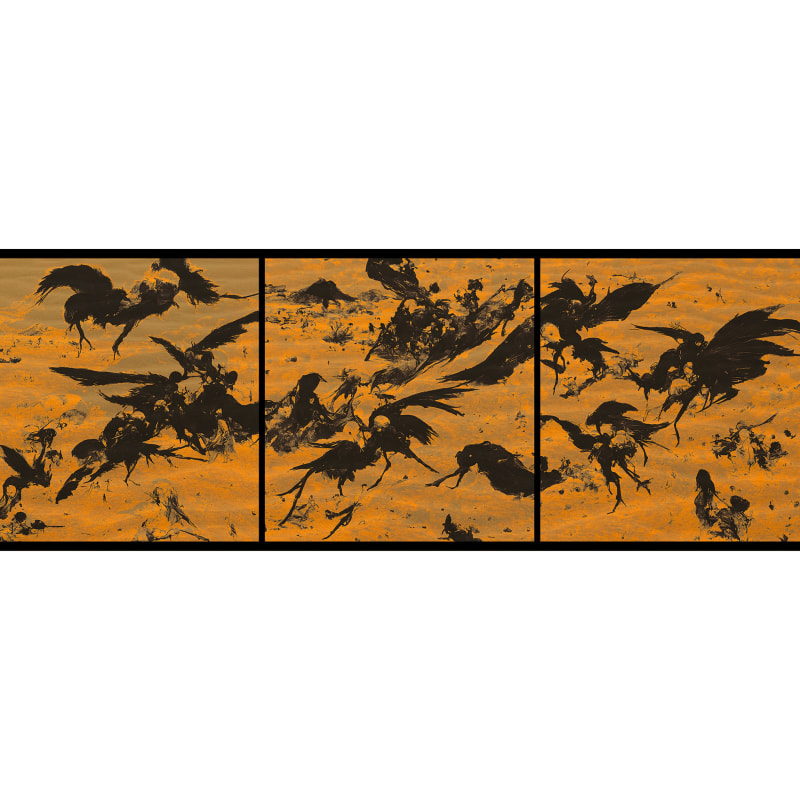In the age of AI digital images, artificial intelligence has made image production abandon "light painting" as the basis, and we are experiencing a visual upheaval dominated by prompts. "World Reversed: the Faces of AI" takes the AI-generated faces as the emotional initiation to examine digital-generated art and its related issues about subject-object relation, medium, and identity.
As the prompt commands, the algorithm, which modifies some parts of images, "Future, the Prompt World," is ultimately assembled into world masterpieces understood by Zhu and the algorithm. These slightly mystical prompts and the randomness of algorithm action awaken the "aura" of generative art.1 In the future, images like these will be flooded into databases and become the picture prompt that cannot be identified as originals or not.
"AI MY EYES: Interweaving Realms" is presented as a diptych. Firstly, it is in-game photography, and Zhu, as a player, photographer, and creator, captures the virtual landscape in the game "Ghost of Tsushima," constructing self-expression in the context of the game. Then, the work consists of generative images in the same context. Both form a coherent and intertextual linkage between the images, which resonates aesthetically, realizing the reproduction of one medium in the other. Similarly, the romantic fantasy of artificial intelligence, "Melodies Borrowed from Yore, "adapts classical aesthetics and legends to depict a near-future apocalyptic landscape.
While the above works deploy AI to complete facsimiles of images, the later series further contemplates the relationship between AI and human beings. "FMAO: BIAS in AI " is a seemingly diverse series of portraits that actually explores the influences of popular aesthetics and bias in AI generation. Due to the complex "ghost mechanism" behind the algorithms, emotions or habits leave a digital footprint in every operation of algorithms, but the user subconsciously reproduces the group's visual biases regarding race, gender, and emotions. "101 Chat Nights of Frosty Solitude" is a series of AI-generated short videos exploring the trend of high-desire, low-demand viewing in the era of extensive data analysis. The work validates that "poor images," which lack picture quality, are reproduced at an accelerating rate under the blessing of today's communication convenience.2 At the same time, viewers are addicted to this technology-manipulated content in an information cocoon constructed by recommender algorithms.
"Whispers in the Subterranean" is an allegory for the medium of images. AI-generated images are cast upon the present environment, and our perception is like in the cave described by Plato: the prisoner perceives the world as "shadows" in the cave. At the same time, the shadows projected onto the wall are in control of the caster. The work echoes the fundamental discussion in "Ship of Theseus" about the relationship between technology and human beings 3- to what extent will human beings have the power to dominate when AI technology, as a medium, floods and even manipulates our lives? Like the "World Reversed" depicting the dangers of uncertainty, this will be the paradox of humans' power relationship with AI.
Notes:
1 Aura: Walter Benjamin refers in his writings to the concept of the "aura" in a work of art, which is the aura carried by the work in the early portraits, and which disappeared from the work of art in the age of mechanical reproduction.
2 Weak Images: In the early days of the network society, due to technological and institutional constraints, digital images were usually distributed free of charge on network platforms in poor-quality, unclear multimedia file formats. "Poor Images were marginalized compared to Rich Images, but today Poor Images cater to the rapid distribution and consumption of the Internet.
3 Ship of Theseus: In the 1st century A.D., Plutarch posited a paradox in which the wood on Theseus's ship was gradually replaced, and whether the ship was still the same. Mostly used in the current discussion of whether technology is replacing humans.